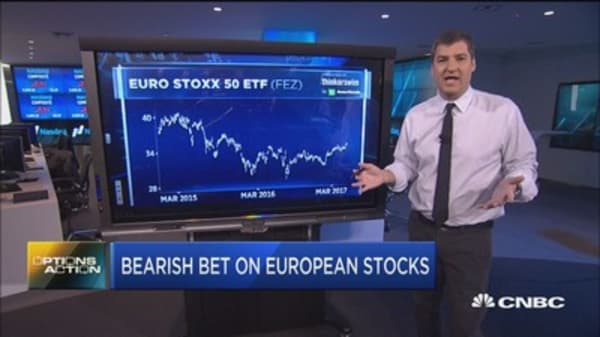Vincent Juvyns, global market strategist at JPMorgan Asset Management, told CNBC that "caution is understandable, given Europe's track record of under-performing other developed markets. But investors should also recognize that a more reflationary global environment will benefit European companies more than most. Absent a major political disruption, we would expect these positive fundamentals to assert themselves in European equity markets over the course of 2017."
Added to that is a compelling valuation gap between U.S. and European stocks. "Valuations for European equities are appealing, with a forward price to earnings ratio of 14.3x for European equities compared with 21.7x for the S&P 500," according to Julian Howard, head of multi asset solutions at GAM.
It might also be worth going against the trend when it comes to currencies.
Last week, currency investors built up the highest bearish positions in pound sterling in 16 weeks. This came as the Brexit Bill passed in parliament, paving the way for Prime Minister Theresa May to trigger Article 50 before the end of March and Nicola Sturgeon, the first minister of Scotland, demanded a second referendum on Scotland's membership in the U.K.
While the consensus trade might be to add to your short sterling positions, Peter Rosenstreich, head of market strategy at Swissquote Bank, said he is looking at the other side of this trade.
"In our view the event of Theresa May triggering Article 50 will have a limited effect on GBP," he told CNBC last week. "First the immediate devaluation of the sterling post Brexit referendum provides protection for further downside. Second, the markets are now completely aware regarding the reality of Brexit and no longer spooked by the prospect of even a "hard" separation. Finally, the resilience, no the strengthening of the U.K. economy has us considering long sterling as the best long term currency trade of 2017."
Equally, a consensus trade has been to bet for the euro/dollar pair to hit parity thanks to political risk.
Those fears may be overdone. Jane Foley, Head of FX Strategy of Rabobank, believes that while the euro might dip a little as we head into the French elections, "opinion polls have consistently implied that the far-right's Le Pen will lose the second round of this election by a large margin. Confirmation of this is likely to result in further short-covering in the EUR. Based on the assumption that Le Pen loses the run off, we maintain our forecast of EUR/USD at 1.10 by year end."
Whatever you do, without a European political crystal ball in front of you – the best trade may not be the obvious one.
Carolin Roth is based in London and is an anchor for Street Signs as well as covering the Swiss market for CNBC. You can follow Carolin on Twitter @CarolinCNBC.
Follow CNBC International on Twitter and Facebook.





